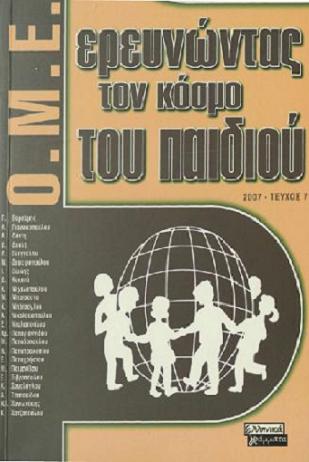Classroom library activities in the kinder gardens: means for implementing Greek language curriculum goals or for developing positive attitudes to reading?

Abstract
The Greek Language Curriculum in the preschool section supports the importance of organized library settings into the kinder gardens as an effective and appropriate literacy environment. A study on the 'classroom library' as an organized place for language activities was carried out in 130 kindergartens during the school year 2003-2004. This article presents classroom library activities that took place in the kindergartens. The results reveal the successful class- library functioning as a literacy environment as well as a multifunctional medium enhancing children's love for books and reading. Various original activities took place promoting children's contacts with books. Technical and cooperational difficulties which appeared during planning and implementing activities indicate the necessity to consider developmental writing level of the individual child, group synthesis of the classroom, socioeconomic, cultural background and children's own 'capital'. Cooperation with parents was shown to be a fundamental factor for the success of a library program. Finally, the difficulties noted suggest reflection and propose engaging in alternative ways for handling a future implementation.
Article Details
- How to Cite
-
Μπατσούτα (Maria Mpatsouta) Μ., Παπαγιαννίδου (Christina Papagiannidou) Χ., & Δάντη (Athina Danti) Α. (2007). Classroom library activities in the kinder gardens: means for implementing Greek language curriculum goals or for developing positive attitudes to reading?. Investigating the child’s World, 7, 70–86. https://doi.org/10.12681/icw.18224
- Issue
- Vol. 7 (2007)
- Section
- Scientific articles & educational projects

This work is licensed under a Creative Commons Attribution-NonCommercial 4.0 International License.
Authors who publish with this journal agree to the following terms:
· Authors retain copyright and grant the journal right of first publication with the work simultaneously licensed under a Creative Commons Attribution Non-Commercial License that allows others to share the work with an acknowledgement of the work's authorship and initial publication in this journal.
· Authors are able to enter into separate, additional contractual arrangements for the non-exclusive distribution of the journal's published version of the work (e.g. post it to an institutional repository or publish it in a book), with an acknowledgement of its initial publication in this journal.
· Authors are permitted and encouraged to post their work online (preferably in institutional repositories or on their website) prior to and during the submission process, as it can lead to productive exchanges, as well as earlier and greater citation of published work.


